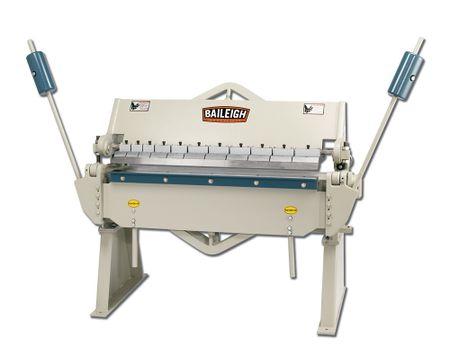Difference between revisions of "Bending Brake"
| Line 24: | Line 24: | ||
== Training == | == Training == | ||
=== Bending Steps === | === Bending Steps === | ||
| + | 1. Ensure that your sheet metal is thinner or equivalent to 14 gauge sheet metal, and ensure that it is less than 48" in width. | ||
| + | |||
| + | 2.If making a bend for a box or a pan, adjust the fingers so that the equivalent width of the fingers is just shorter than your sheet metal. | ||
== Safety == | == Safety == | ||
== Documentation == | == Documentation == | ||
Revision as of 18:35, 1 February 2019
A bending brake is a metalworking machine that allows the bending of sheet metal. The brake in the shop is a Chicago W31 steel box and pan brake. In a box-and-pan brake (also known as a finger brake), the clamping bar includes several removable blocks, which may be removed and rearranged to permit bending of restricted areas of a piece of sheet metal or of already partially formed pieces. After bending, a box or pan form is then completed by screw, solder, weld, rivet, or other metal fixing process.
Resources
Training
Bending Steps
1. Ensure that your sheet metal is thinner or equivalent to 14 gauge sheet metal, and ensure that it is less than 48" in width.
2.If making a bend for a box or a pan, adjust the fingers so that the equivalent width of the fingers is just shorter than your sheet metal.
